#Israel Zangwill
Text
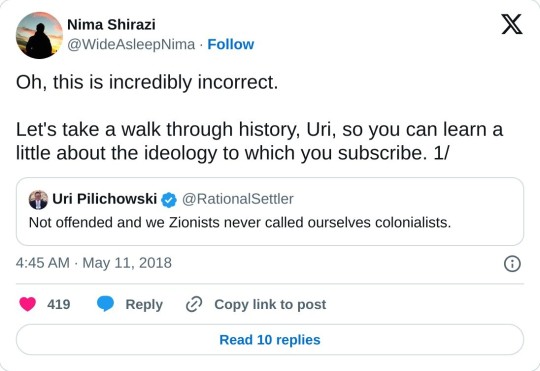
In 1862's 'Rome and Jerusalem,' perhaps the earliest Zionist text, Moses Hess asked France to "help the Jews to found colonies which may extend from Suez to Jerusalem and from the banks of the Jordan to the coast of the Mediterranean." 2/
In late August 1898, the Second Zionist Congress established the Jewish Colonial Trust, the financial arm of the World Zionist Organization and the first official Zionist bank. In 1902, the Anglo-Palestine Company Ltd. was founded as a subsidiary of the Jewish Colonial Trust. 3/
In 1902, Theodor Herzl, father of political Zionism, begged Cecil Rhodes to support the Zionist project and facilitate Jewish settlement of Palestine. Zionism was in Britain's imperial interest, Herzl suggested, "Because it is something colonial." 4/
Revisionist Zionist leader Vladmir Jabotinsky, who founded and led the Irgun militia, wrote explicitly in his 1923 Zionist manifesto, "The Iron Wall," that "Zionism is a colonization adventure and therefore it stands or it falls by the question of armed force." 5/
Jabotinsky also wrote, "Zionist colonization, even the most restricted, must either be terminated or carried out in defiance of the will of the native population," and that it was "necessary to carry on colonization against the will of the Palestinian Arabs." 6/
One of the leading Zionist organizations supporting the Yishuv (Jewish settlers) in Mandatory Palestine was the Palestine Jewish Colonization Association, established in 1924. (It was originally founded in 1891 as the Jewish Colonization Association.) 7/
The Jewish Agency, formed in 1929 by the 16th Zionist Congress, was (and is still) tasked with increasing Jewish immigration to Palestine. Its fundraising arm originally operated under the auspices of World Zionist Organization's aptly-named "Colonization Department." 8/
On October 5, 1937, David Ben-Gurion - later Israel's first prime minister - sent a letter to his son Amos in which he wrote that "Palestine...contains vast colonization potential which the Arabs neither need nor are qualified (because of their lack of need) to exploit." 9/
In mid-1947, the Jewish Agency presented its position to the United Nations Special Committee on Palestine. It declared "industrial development in Palestine" was "part of...the migration of industry from the old industrial countries to colonial or semi-colonial territories." 10/
During the presentation, Chaim Weizmann-later Israel's 1st president-stated, "As compared with the result of the colonizing activities of other peoples, our impact on the Arabs has not produced very much worse results than what has been produced by others in other countries." 11/
Moshe Shertok-Israel's 2nd prime minister-boasted of Zionism to the UNSCOP, saying "it will not be easy to find an instance in the history of colonization where a large scale settlement scheme has been conducted with so much respect for the interests of existing population." 12/
Clearly, Zionism's colonial nature was explicit from the outset and was leveraged as a selling point to gain European support. When colonialism began to lose legitimacy, the term was retired.
So don't ever claim that "we Zionists never called ourselves colonialists."
13/END
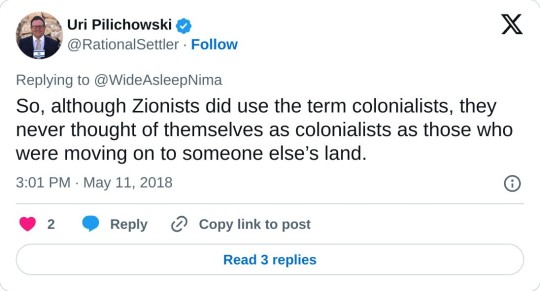
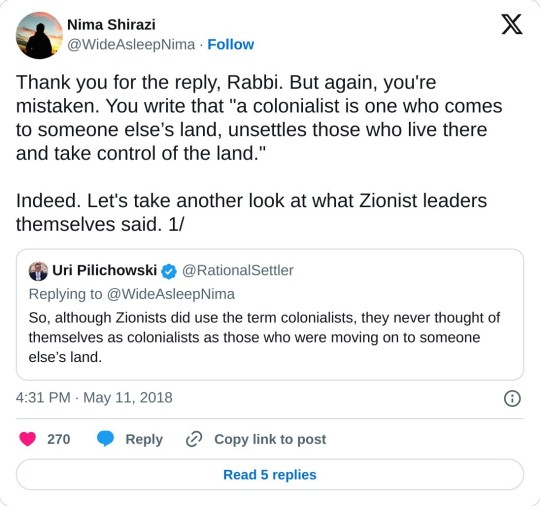
In 1891 leading Zionist thinker Asher Ginsburg (Ahad Ha'am) wrote that "when the life of our people in Palestine will develop to such an extent as to push out, to a small or large extent, the indigenous population of the country, then not easily will they give up their place." 2/
In 1898, Theodor Herzl recognized that, in order to establish a "Jewish state" in Palestine, the inconvenient indigenous population would have to be removed. “We shall try to spirit the penniless [Palestinian Arab] population (i.e. Arab) across the border," he wrote. 3/
Israel Zangwill, British leader of the Jewish Territorialist Organization (ITO), wrote in 1904 of "a difficulty from which the Zionist dare not avert his eyes, though he rarely likes to face it." It was that "Palestine proper has already its inhabitants." 4/
So what was his solution? "We must be prepared...to drive out by the sword the tribes in possession as our forefathers did."
Similarly, Chaim Weizmann referred to Palestinians as "the rocks of Judea, as obstacles that had to be cleared on a difficult path." 5/
his 1926 address to Nat'l Conference of the United Palestine Appeal in Boston, Weizmann said Palestinians "are in the country, and have been there for ages. We are the newcomers and have to become part and parcel of the country. We are planting a new people in the country. 6/
In 1929, early Labor Zionist intellectual Berl Katznelson declared, "Zionist enterprise is an enterprise of conquest," admitting that "it is by no chance that I use military terms when speaking of settlement." 7/
In 1930, Menachem Usshishkin, a powerful early pioneer of Zionism and leading member of the Jewish National Fund, stated, "If there are other inhabitants there [in Palestine], they must be transferred to some other place. We must take over the land." 8/
in 1936, Ussishkin commented, "Now the [Palestinian] Arabs do not want us because we want to be the rulers. I will fight for this. I will make sure that we will be the landlords of this land...because this country belongs to us not to them." 9/
In 1936, another leading Zionist, Arthur Ruppin, who led colonization efforts through the Jewish National Fund, declared, "On every site where we purchase land and where we settle people, the present cultivators will inevitably be dispossessed." 10/
In June 1937, David Ben-Gurion wrote to Jewish Agency head Moshe Shertok, "Were I an Arab...I would rebel even more vigorously, bitterly, and desperately against the immigration that will one day turn Palestine and all its Arab residents over to Jewish rule." 11/
Ben-Gurion told the 20th Zionist Congress in August 1937, "New Jewish settlement will not be possible unless there is a transfer of the Arab peasantry," adding, "Jewish power in the country...will also increase our possibilities to carry out the transfer on a large scale." 12/
At the November 21, 1937 meeting of Jewish Agency's Transfer Committee, Yosef Weitz, Land Department chief at the Jewish National Fund, boasted that "transfer" not only "diminish[es] the Arab population," but also "release[s] it for Jewish inhabitants." 13/
In 1938, Ben-Gurion reaffirmed these sentiments: "Let us not ignore the truth among ourselves. Politically we are the aggressors and they defend themselves. The country is theirs, because they inhabit it, whereas we want to come here and settle down." 14/
At the same time, Ussishkin insisted, "We cannot start the Jewish state with...half the population being Arab...Such a state cannot survive even half an hour." Regarding the forcible ethnic cleansing of over sixty thousand Palestinian families, he added: "It is most moral." 15/
Ruppin agreed: "I do not believe in the transfer of individuals. I believe in the transfer of entire villages." He also wrote, "Land is the most necessary thing for establishing roots in Palestine...We are bound in each case...to remove the peasants who cultivate the land." 16/
Moshe Shertok, Jewish Agency chief and later Israel's second prime minister, said, "We have forgotten that we have not come to an empty land to inherit it, but we have come to conquer a country from people inhabiting it." 17/
On March 20, 1941, the Jewish Agency's Yosef Weitz wrote, "The complete evacuation of the country from its other inhabitants and handing it over to the Jewish people is the answer." 18/
In 1941, Weitzmann told Ivan Maisky, Soviet ambassador to England, that "if half a million Arabs could be transferred, two million Jews could be put in their place. That, of course, would be a first installment; what might happen afterwards [would be] a matter for history." 19/
In a 1941 memorandum entitled "Outlines of the Zionist Policy", Ben-Gurion recognized that "the majority of the Arabs could hardly be expected to leave voluntarily," noting, "Complete transfer without compulsion – and ruthless compulsion, at that – is hardly imaginable." 20/
Founder and longtime president of the World Jewish Congress Nahum Goldmann recalled Ben-Gurion saying in 1956, "Why should the Arabs make peace? If I was an Arab leader I would never make terms with Israel. That is natural: we have taken their country." 21/
In 1969, Moshe Dayan declared, "Jewish villages were built in the place of Arab villages...There is not a single place built in this country that did not have a former Arab population." 22/
Again, Zionism is a colonial ideology that explicitly relies on the forceful removal of the native population from its homeland. To live in peace with those you have displaced, dispossessed & disenfranchised, you must guarantee equal rights for all. 23/END
#zionism#israel#nima shirazi#history#Moses Hess#Theodor Herzl#Cecil Rhodes#Vladmir Jabotinsky#David Ben-Gurion#Chaim Weizmann#Moshe Shertok#Asher Ginsburg#Ahad Ha'am#Israel Zangwill#Berl Katznelson#Menachem Usshishkin#Arthur Ruppin#Yosef Weitz#Nahum Goldmann#Moshe Dayan#colonialism#settler colonialism#irgun
14 notes
·
View notes
Text
“ Il 28 ottobre 1922 era arrivato alla stazione di Firenze il celebre scrittore inglese Israel Zangwill, che, essendosi rifiutato di consegnare il passaporto alle camicie nere, che avevan occupato la stazione, veniva fermato ed accompagnato alla sede del Fascio. Ivi il console Tamburini, che non conosceva l'inglese, e, d'altronde, non era in grado di conversare con un grande scrittore, non trovò di meglio che consegnarlo a Curzio Suckert, il quale riferisce il colloquio nella penultima parte del suo libro Technique du coup d'Etat. La tesi di Zangwill era quella di tutti gli italiani non fascisti: la marcia su Roma era conseguenza di un compromesso tra il re e Mussolini; l'insurrezione non era che una messa in iscena per nascondere il gioco della monarchia. Naturalmente la tesi di Suckert era diametralmente opposta, poiché tutto il libro è diretto a teorizzare la nuova tecnica del colpo di Stato, di cui quello fascista sarebbe stato una delle piú brillanti applicazioni.
Ora a distanza di tanto tempo e specialmente dopo il nuovo colpo di Stato del 25 Luglio 1943, appare chiaro quanto fondamento avesse l'opinione di Israel Zangwill, nella quale le dissertazioni letterarie di Suckert, invece di dissuaderlo, avranno finito per confermarlo.
Una rivoluzione che non abbatte e non distrugge il vecchio regime e si limita soltanto alla violazione di « vieti formalismi », non è certamente una rivoluzione, anche se formalmente si mostra ossequiente ai canoni della nuova « tecnique du coup d'Etat ». Per lo meno è un avvenimento « sui generis » che la scienza politica non ha ancora classificato, e per il quale bisognerà certamente trovare una nuova definizione. Per lo meno è una rivoluzione mancata, poiché il compromesso, intervenuto tempestivamente, ha impedito ad una delle parti di prevalere e tutto si è limitato a minacce di adoperare la violenza da una parte e dall'altra, eliminate per effetto della reciproca vigliaccheria.
Ora, tutto ciò è tipicamente italiano, e Mussolini, nell'inscenare l'avvenimento, ha certamente seguito il genio della stirpe. Tutto il suo battagliare e il suo manovrare non era diretto a schiantare e distruggere la vecchia classe dirigente, ad innovare il costume politico, a sostituire alle vecchie nuove idee, ma era diretto a farsi chiamare dal re per formare un ministero di coalizione. Egli, dunque, si offriva come domatore di bestie feroci, e, come tale fu assunto al potere, poiché si ritenne un poco da tutti che potesse essere — proprio lui — l'affossatore del fascismo, il castigatore degli istinti bestiali ed anarchici dei fascisti. Che poi il suo pessimo temperamento di uomo e le sue profonde tare politiche abbiano in seguito messo in luce l'illusorietà del calcolo, non modifica il fatto che coloro i quali favorirono la marcia su Roma, ed in seguito si offrirono di fiancheggiarla, andavano in cerca di un nuovo Giolitti, di un Giolitti piú moderno, cioè di un dittatore legale, che avesse conservato il regime, togliendo alle masse ogni velleità di innovazione. “
---------
Brano tratto dal libro di Guido Dorso Mussolini alla conquista del potere (Einaudi, 1949).
#Guido Dorso#citazioni#letture#leggere#antifascismo#libri#Mussolini alla conquista del potere#XX secolo#Israel Zangwill#Storia d'Italia del '900#Curzio Malaparte#Vittorio Emanuele III#marcia su Roma#squadrismo#monarchia#politica#violenza#Giovanni Giolitti#Italia liberale#rivoluzione#cambio di regime#intellettuali italiani del XX secolo#colpo di Stato#scienza politica#rivoluzione passiva#trasformismo#meridionalismo#borghesia#primo dopoguerra#secondo dopoguerra
9 notes
·
View notes
Text
Israel Zangwill - [Um dia, estando entre nós dois o Atlântico]
"[Um dia, estando entre nós dois o Atlântico]", um poema de Israel Zangwill
Um dia, estando entre nós dois o Atlântico,senti a tua mão na minha;Agora, tendo a tua mão na minha,sinto entre nós dois o Atlântico.
Trad.: Cecília Meireles
REPUBLICAÇÃO: poema publicado na página originalmente em 27/02/2019
Mais do que uma leitura, uma experiência. Clique, compre e contribua para manter a poesia viva em nosso blog

View On WordPress
0 notes
Text
A man likes his wife to be just clever enough to comprehend his cleverneths, and just sthtupid enough to admire it.
Daffy to Daphne Duck
0 notes
Text

Zachary Foster, Ph.d, historian of Palestine, has made a thread of a brief history of Israel's ethnic cleansing of Palestinians from 1890 to present. [His newsletter: Palestine, in Your Inbox] Pasted below:
Yesterday, on October 24, 2023, Israel's plans to expel Gaza's Palestinian population to Sinai, Egypt were leaked. Not surprisingly, this plan has a decades long history and dates to at least 2004, if not earlier. (Source)

Between Oct 7, 2023-present, Israel has displaced ~1.4 million Palestinians in Gaza through its campaign of indiscriminate bombing. (Source)
In May 2023, 178 Palestinian Bedouins were forced out of Ein Samiya (West Bank) after Israel repeatedly demolished their homes, threatened to destroy their only school & after their grazing land was taken by settlement expansion & b/c of settler violence: [Link]

In July 2022, the 100-person community in Ras a-Tin (WB) was pushed after a Jewish settler outpost was established 2km away. Since then, members of the Palestinian community have suffered from verbal abuse, harassment, theft & vandalism of property. [Link]
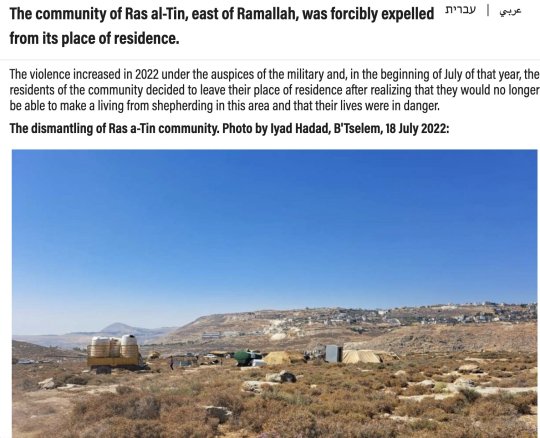
Between Aug 2022- August 2023, the 88-person community in al-Qabun was pushed out by Israeli Jewish settler violence & assaults by the Israeli army. [Link]

In July 2020, Israel made 70 Palestinians homeless in Khirbet Humsa for the 6th time. Israeli forces loaded the residents' personal belongings and dropped them off 7 miles away. [Link]

In 2019, 2 groups of Palestinian families near the Taybeh junction were pushed out:

Between June 1967 - 2016, Israel revoked the residency status--and thus the right to live in Jerusalem (or anywhere else in Israel) -- of at least 14,595 Palestinians from East Jerusalem in what amounts to "forcible transfers," according to @hrw. (Source)

Between 1968 -1971, Israel expelled 615 Gazan residents. Between, 1971-1988, Israel expelled another 90 Palestinains from Gaza. Source: Sara Roy, The Gaza Strip: The Political Economy of De-development, p.110

In 1967, Israel expelled 250K-325K Palestinians, including from Imwas, Yalo, Bayt Nuba, Surit, Beit Awwa, Beit Mirsem, Shuyukh, Jiftlik, Agarith & Huseirat. (Source: one, two)

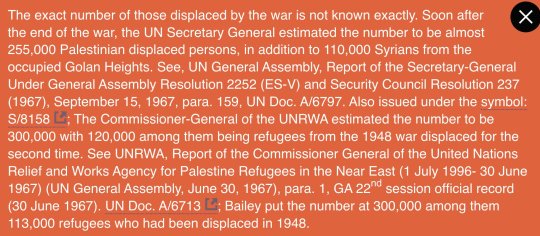
In 1948, Zionist forces expelled hundreds of thousands of Palestinians from their homes. They also refused to allow ~750,000 Palestinians who were made refugees during the war back to their homes.
Source:

B/w 1891-1948, most Zionist leaders, inc. Theodor Herzl, Ahad Ha'am, Israel Zangwill, Arthur Rupin, M. Smilansky, L. Motzkin, Yoseph Weitz, Chaim Weizmann, M. Usshishkin, D. Ben Gurion, Moshe Shertok, thought it would be required to expel the Palestinians: [Quote Tweet]
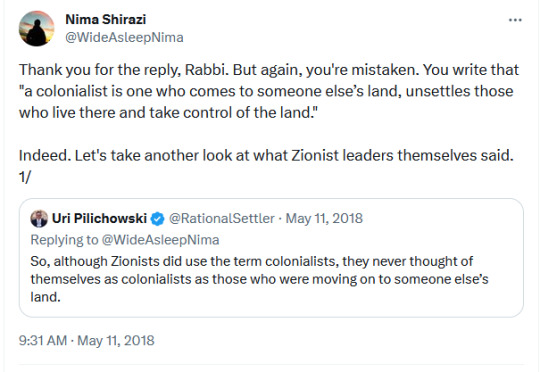
Here are some additional screenshots if the statements of Zionist leaders from 1890-1948. And you wonder why so many people think Zionism was such a problematic, dare I say, racist idea?


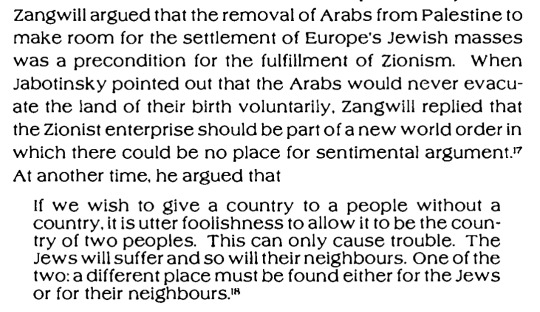

#palestine#geopol#long post#not sure if the format translates very well so ive provided a link to the thread as well.#📁.zip
267 notes
·
View notes
Quote
Proposals to physically transfer Palestinians out of the country have a long history in Zionism. Theodor Herzl confided in his diaries: “We shall try to spirit the penniless population across the border by procuring employment for it in the transit countries, while denying it employment in our own country.” Israel Zangwill, the Jewish writer who coined the phrase “A land without a people,” complained that Palestine is not so much occupied by the Arabs as overrun by them.” Invoking the Boer’s Great Trek in South Africa, he proposed that “we must greatly persuade [the Arabs] to ‘trek’. After all, they have all Arabia with its million square miles – not to mention the vast new area freed from the Turk between Syria and Mesopotamia – and Israel has not a square inch.” If they “fold their tents” and “silently steal away,” he felt sure that the Jews would be prepared to pay their travelling expenses. Ben-Gurion, the architect of the Nakba, had long advocated for “compulsory transfer.” In 1937, he established a Committee on Population Transfer within the Jewish Agency. And, of course, transfer, a euphemism for ethnic cleansing, was in fact carried out at a mass level in 1948 and again in 1967. One of its most notorious perpetrators, Yosef Weitz, the Director of the Jewish National Fund’s Land Settlement Department, wrote:
'It must be clear that there is no room in the country for both peoples … The only solution is a Land of Israel without Arabs…. There is no way but to transfer the Arabs from here to the neighbouring countries, to transfer all of them, perhaps with the exception of Bethlehem, Nazareth and the old Jerusalem. Not one village must be left, not one tribe.'
Jeff Halper, Decolonizing Israel, Liberating Palestine: Zionism, Settler Colonialism, and the Case for One Democratic State
278 notes
·
View notes
Text
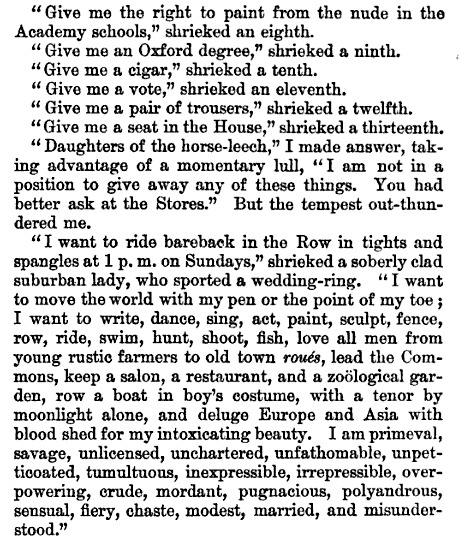
davidmalki:
source: Israel Zangwill, Without Prejudice, 1899. This description, at the time meant to be as absurd a set of charges and demands as could be placed in a straw woman’s mouth, today reads like a beautiful manifesto.
308 notes
·
View notes
Photo




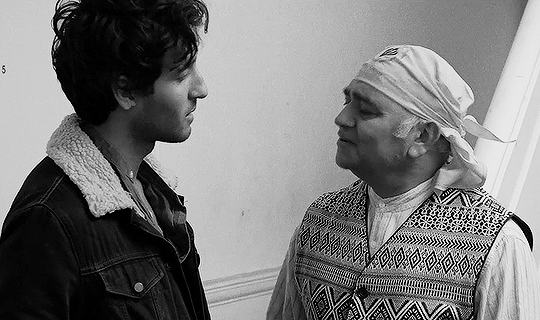




ASSAD ZAMAN as Rohit in The Saint Of Southall (2020), dir. Isher Sahota
Written and directed by Sahota, based on a short story by Israel Zangwill. Aleena and Rohit, played by Mona Goodwin and Assad Zaman, are a young couple living in a shared house in Southall, West London. Living with Kulwinder (Kulwant Sahota), her wheelchair-bound grandson Amar (Jahan Anand), and Tejinder (Bhasker Patel), amongst others, it’s Tejinder who believes he has seen a divine apparition whilst out on a walk. Coinciding with the religious festival Vaisakhi, upon hearing about the vision, Kulwinder is adamant that the resonance of the sighting on such a holy day will heal her grandson. But has there simply been a misunderstanding?
#assad zaman#the saint of southall#here you go#what did i say about taking photoshop from me???#anyway go watch this#it's short but beautiful#romisedits
204 notes
·
View notes
Quote
The past is for inspiration, not imitation, for continuation, not repetition.
Israel Zangwill
#scriptwriting#screenwriting#amwriting#writing#writingquotes#writingadvicre#writing quotes#writing advice
19 notes
·
View notes
Text
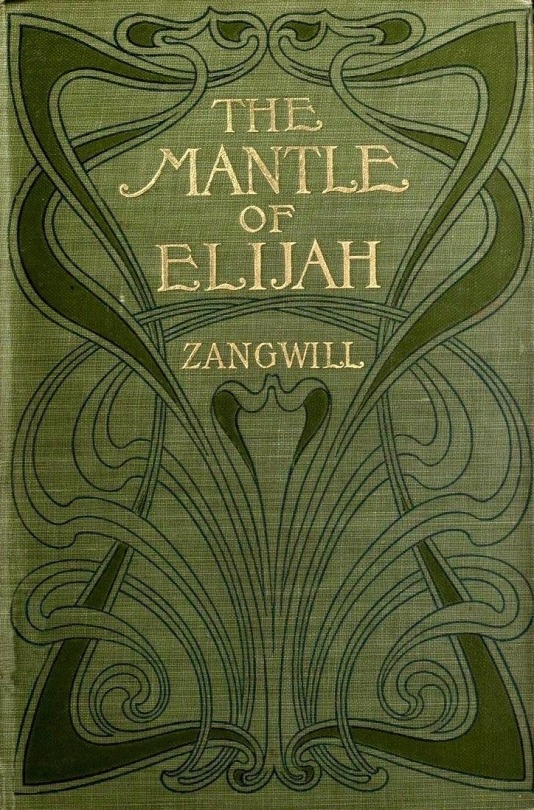
THE MANTLE OF ELIJAH by Israel Zangwill. (New York/London: Harper, 1901). Illustrated by Lewis Loeb.
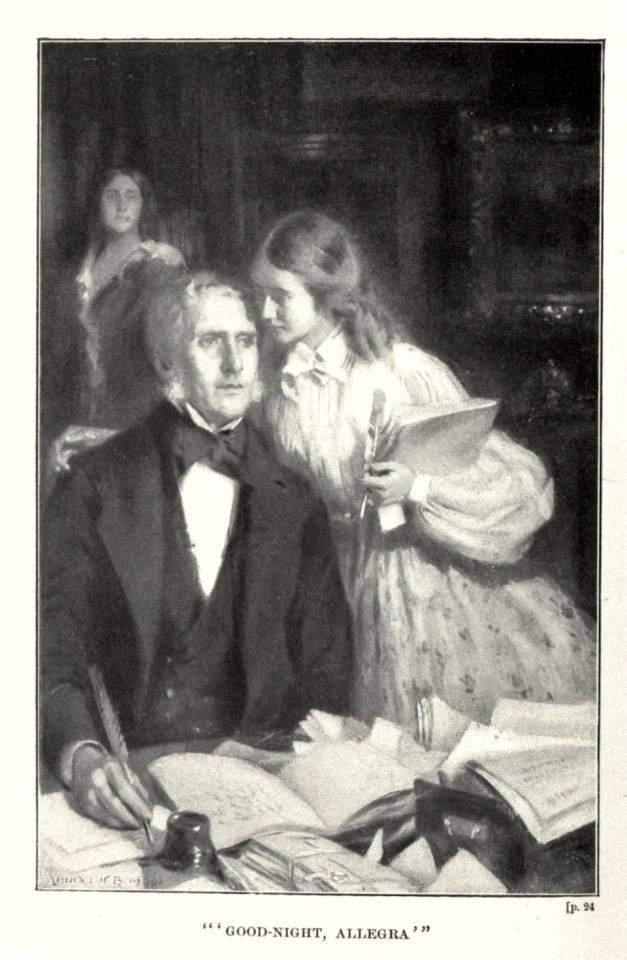
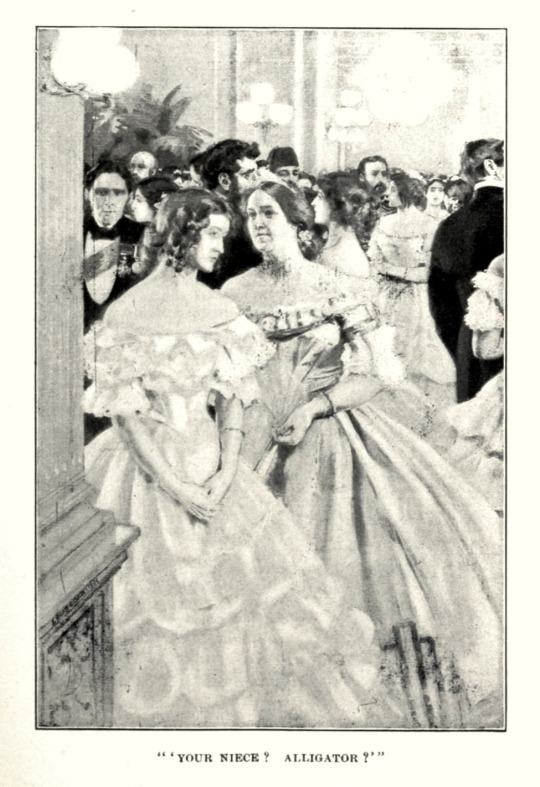
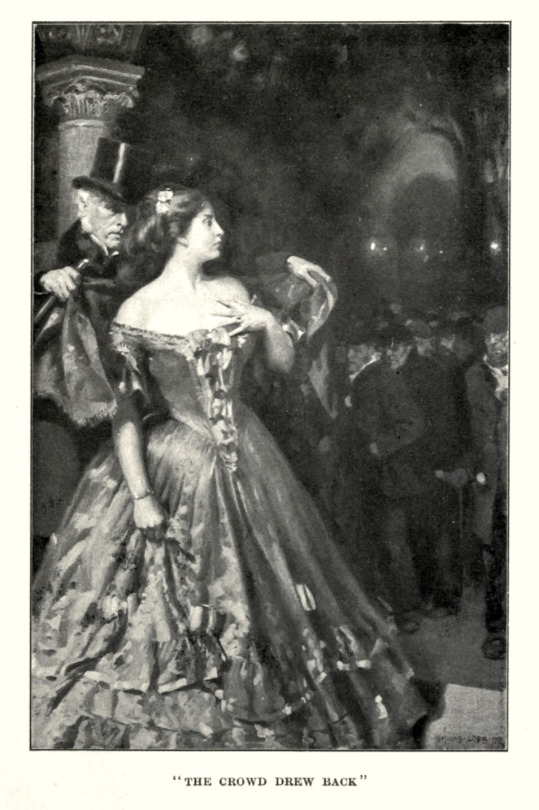
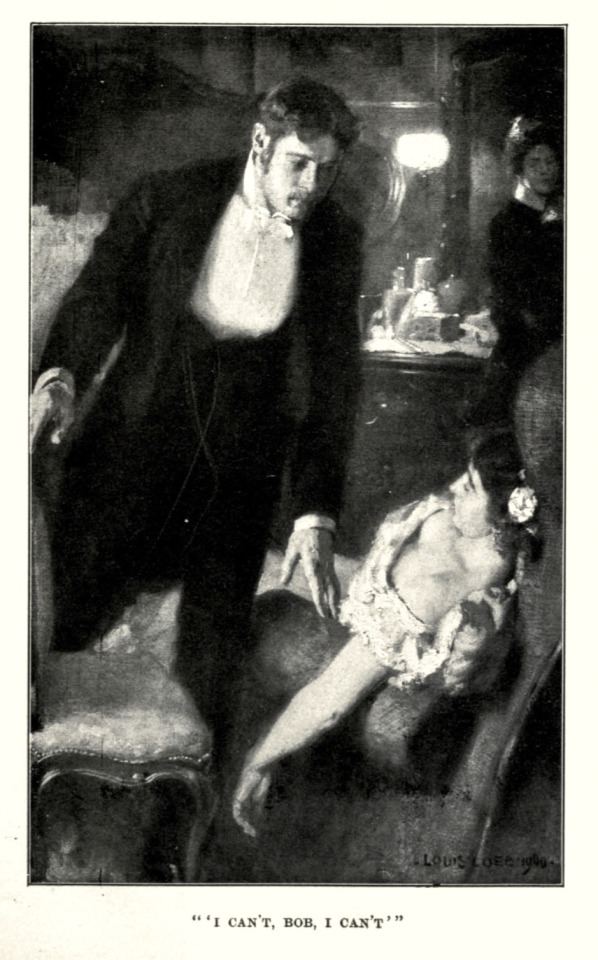
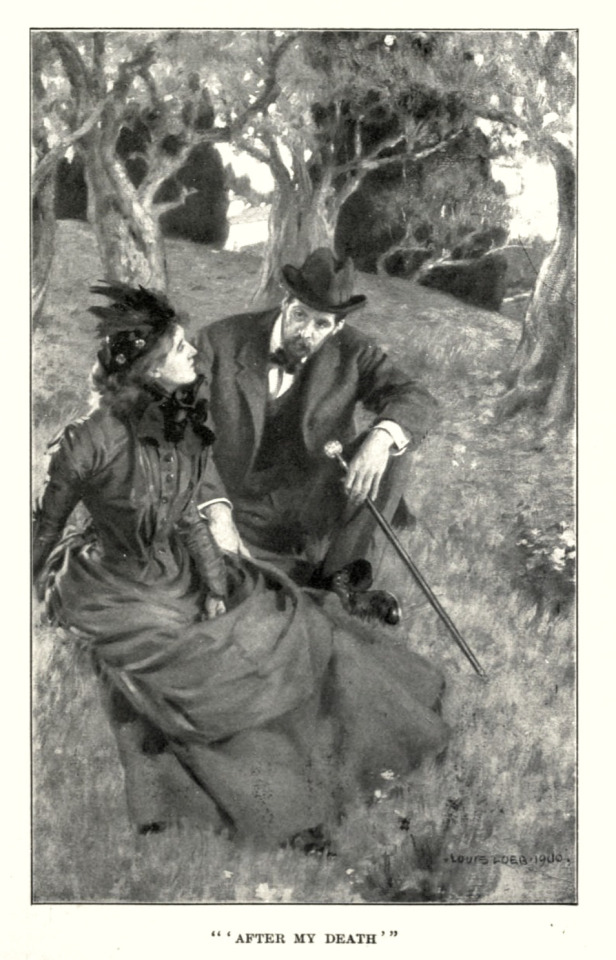
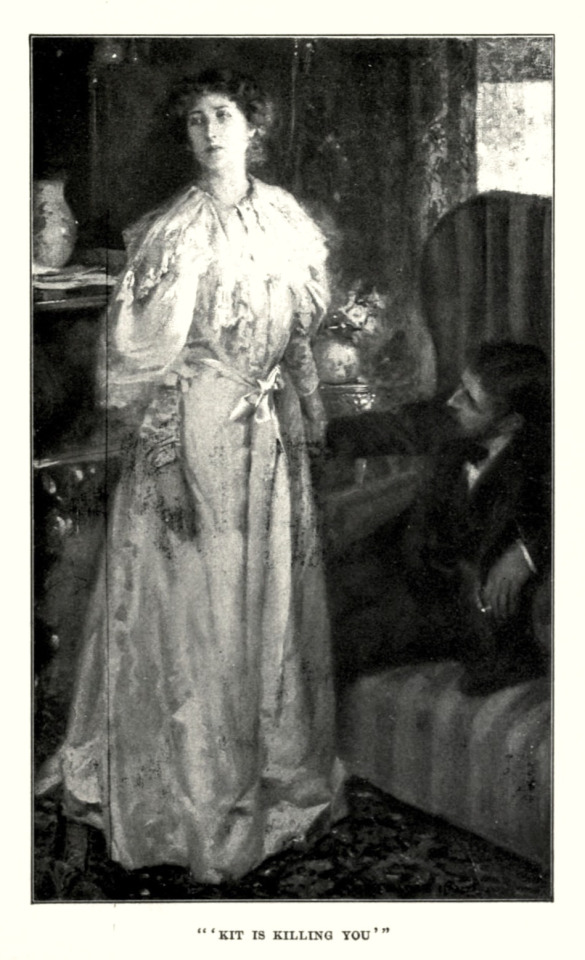
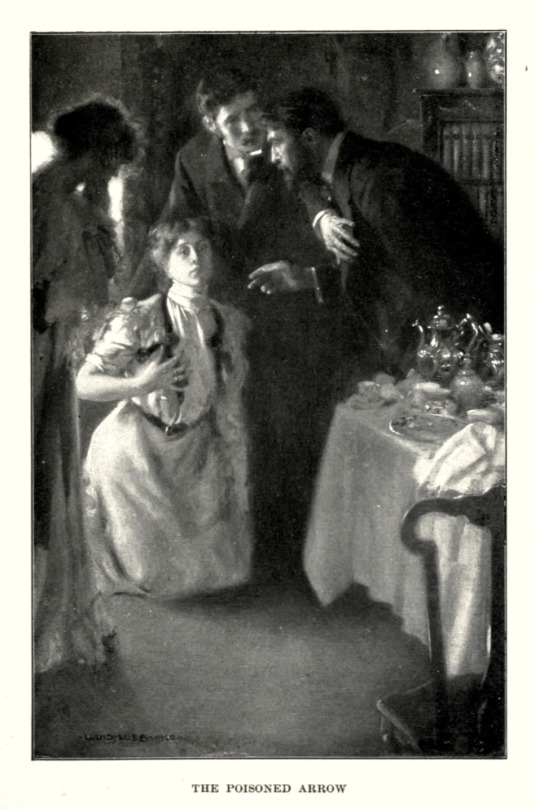
source
#beautiful books#book blog#books books books#book cover#books#illustrated book#vintage books#edwardian books
20 notes
·
View notes
Text
[Israel] Zangwill’s more public stance can be seen in the publication of his book, The Voice of Jerusalem, in 1920. There, he advocated an “Arab exodus” that would be based on “race redistribution” or a “trek like that of the Boers from Cape Colony,” which he advocated as “literally the only ‘way out’ of the difficulty of creating a Jewish State in Palestine.”
—Nur Masalha, from Expulsion of the Palestinians: The Concept of "Transfer" in Zionist Political Thought, 1882-1948
2 notes
·
View notes
Text
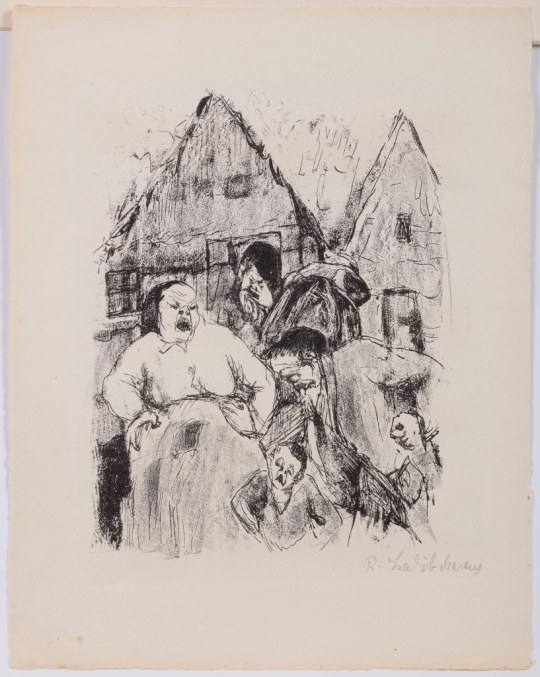
Rahel Szalit-Marcus, "The Street Sneezes," from "Motl, Peysi the Cantor’s Son," 1922.
(Lithograph; 13 x 11-1/2 in.[33 x 29.2 cm.])
Before 1924, Szalit-Marcus completed illustrations to works by Sholem Aleichem, Martin Buber, Charles Dickens, Fyodor Dostoyevsky, Heinrich Heine, Mendele Moykher Sforim, and Israel Zangwill.
0 notes
Text
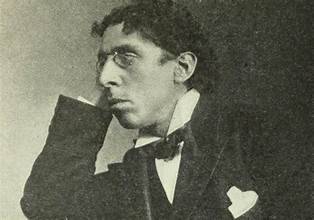
Alredered Remembers Israel Zangwill, English Jewish author, who wrote The Jewish Race (1911) and Children of the Ghetto, on his birthday.
"The Past: Our cradle, not our prison; there is danger as well as appeal in its glamour. The past is for inspiration, not imitation, for continuation, not repetition."
-Israel Zangwill
0 notes
Text
What are the disadvantages of a relationship that begins with love at first sight?
“The only true love is love at first sight; second sight dispels it.” —Israel Zangwill
Arguments against the possibility of love at first sight are usually based on two main reasons.
The first reason is that romantic love includes not only attraction to physical appearance, which is the basis of sexual desire, but also knowledge of the other person’s character traits, such as kindness, honesty, intelligence, and sense of humor. This understanding cannot occur at first glance, because it requires familiarity and a shared history. In love at first sight, the high value assigned to the other person’s external appearance is projected onto her internal characteristics. Love at first sight is often misleading because it is based more on imagination than on vision; however, it can still be love, and often very strong.
The second reason is that love is not only composed of feelings; rather, it essentially involves activities that cannot be performed at the first sight. In this regard, we can distinguish between the preparation for action and the performance of an act. Preparation for action, rather than actual behavior, is the basis of emotion (PT, 2013).
References
Psychology Today. (2013, November 17). Is Love at First Sight Possible?
1 note
·
View note
Text
New York is the great stone desert.
— Israel Zangwill
0 notes
Link
Check out this listing I just added to my Poshmark closet: Great Detectives: A Century of the Best Mysteries from England and America - HC.
0 notes